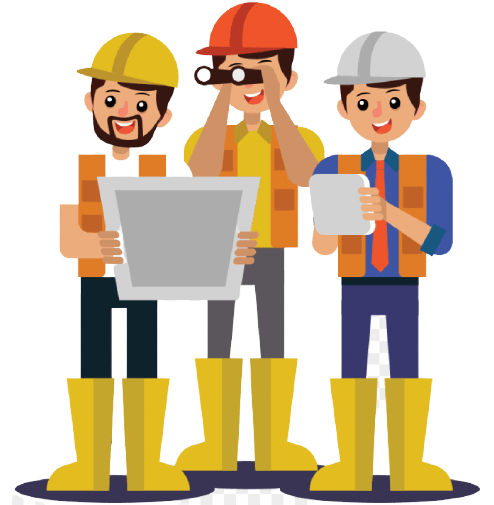CSCS Practice Test
You have 45 minutes to answer 50 multiple choice CSCS Health, Safety and Environment Test questions for Operatives and Specialists. You need to answer at least 45 out of 50 questions correctly to pass. Answers may be reviewed after each question or at the end of the test. Good luck!
[wp_quiz id=”1019″]

What is the CSCS Test?
Though the construction industry has seen its fatalities and accident figures lessen significantly over the last couple of decades, the number of construction-related injuries, accidents and deaths still continues to be a huge cause for concern.
The CSCS (Construction Skills Certification Scheme) Test, also known as the health, safety and environment test is designed to give individuals working in the construction industry the required knowledge so that they can identify hazards on site and confidently take steps to prevent dangerous incidents from taking place. It ensures a minimum level of health, safety and environmental awareness is met by workers before going on site.
The test has different levels which fit the various jobs and roles on site. For example, labourers and bricklayers need to pass the CSCS Test for Operatives while Quantity Surveyors or Architects need to take and pass the CSCS Test for Managers and Professionals.
The CSCS exam will contain questions from five key sections containing 16 categories in total, which you will need to have knowledge of:
- Section A: Working environment
- Section B: Occupational health
- Section C: Safety
- Section D: High risk activities
- Section E: Specialist activities
Section A: Working environment
General responsibilities: ○ How the Health and Safety Executive enforces the law ○ What the law requires ○ Providing safe ways of working ○ Sharing information and knowledge
Accident reporting and recording: ○ Common types of accidents and incidents ○ Occupational diseases ○ Prevention – what can be done ○ Reporting and recording accidents – when, why and how
First aid and emergency procedures: ○ Discovering a casualty ○ First aid ○ What employers must provide
Personal protective equipment: ○ Policies and site rules ○ Types of personal protective equipment ○ Types of respiratory protective equipment
Environmental awareness and waste control: ○ Sustainability ○ Environmental responsibilities ○ Pollution ○ Waste materials ○ Nuisances ○ Plants and wildlife ○ Archaeology and heritage
Section B: Occupational health
Dust and fumes (Respiratory hazards): ○ Controlling exposure to hazards ○ Health conditions caused by dust and fumes ○ How to protect yourself and others from respiratory hazards
Noise and vibration: ○ Employer responsibilities ○ Hearing protection ○ Noise action levels ○ Equipment that can cause HAVS (Hand-Arm Vibration Syndrome) ○ Managing vibration risks ○ Reducing vibration risks
Health and welfare: ○ Common causes of work-related ill health and how they can be avoided ○ Diseases carried in the blood ○ Drugs and alcohol ○ Stress and mental health at work ○ Welfare and support facilities on site
Manual handling: ○ Manual handling assessment ○ Lifting and handling safely
Section C: Safety
Safety signs: ○ Mandatory signs – must do ○ Prohibition signs – must not do ○ Warning signs ○ Emergency escape and first aid signs – safe conditions ○ Fire-fighting signs
Fire prevention and control: ○ Emergency procedures ○ Hot works ○ Portable fire extinguishers ○ Highly flammable liquids and gases ○ Ignition and fuel sources
Electrical safety, tools and equipment: ○ Electrical voltages ○ Using extension leads and cables ○ Electrical hazards ○ Introduction to hand-held tools and equipment ○ Safe methods of working ○ Types of hand-held tools and equipment
Section D: High risk activities
Site transport safety and lifting operations: ○ Accidents ○ Management of mobile plant ○ Mobile plant and site vehicles ○ Working safely
Working at height: ○ Planning the work ○ Hierarchy for working at height ○ Requirements for working at height ○ Types of access equipment
Excavations and confined spaces: ○ Poisonous or flammable gases and fumes ○ Underground services ○ Hazards ○ Working in a confined space
Hazardous substances: ○ What your employer should be doing ○ How hazardous substances can affect your health ○ How hazardous substances can get into your body (routes of entry) ○ Identifying hazardous substances ○ Disposal of hazardous substances
Section E: Specialist activities
For those candidates looking at sitting a specialised test, additional questions will be offered based on your specialist activity alongside the standard CSCS questions.
At present, there are 12 available, including:
- Demolition
- Ductwork
- Heating and Plumbing Services
- Highway Works
- Lifts and Escalators
- Pipefitting and Welding
- Plumbing (JIB)
- Refrigeration and Air Conditioning
- Services and Facilities Maintenance
- Specialist Working at Height
- Supervisory
- Tunnelling
Taking the CSCS Test
The CSCS Test consists of 50 knowledge questions and has a duration of 45 minutes.
These 50 knowledge questions are selected from four key sections (labelled as A to D) containing 16 categories in total. These are listed above.
These factual questions relate to real life concerns which you’ll come across on a regular basis when working in construction. For each specialist test, you’ll also find additional knowledgeable question banks included.
You aren’t expected to have extensive knowledge of regulation concerns, but you are expected to show understanding of what’s required of you, including what you should and shouldn’t do in specific circumstances. This includes, for example, when discovering accidents.
The legislation used in the UK differs from that of Northern Ireland and Scotland. For this reason, all candidates, whether UK, Scotland or Northern Ireland based, will all be tested on the remainder of the UK legislation, for practicality.
Types of Questions
There are six different styles of knowledge type questions included in your test, including:
Multiple choice and multiple choice with images
For these types of questions, you will be required to choose from one or more answers taken from a list of options. There are also multiple-choice questions which may also contain several images to select from.
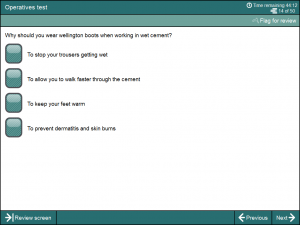
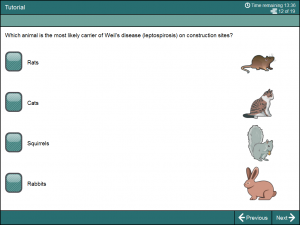
Drag and drop text and drag and drop images
These question types require you to answer by dragging and dropping the relevant text or image from a list of options and placing it in the answer area.


Hot spot questions
Hot spots questions are answered by selecting the correct place from the given image.
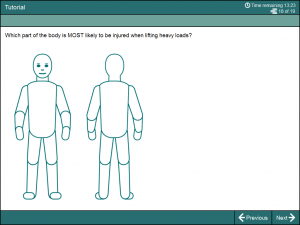
Hot area questions
Hot area questions are answered by selecting one of the answer areas within the given image.
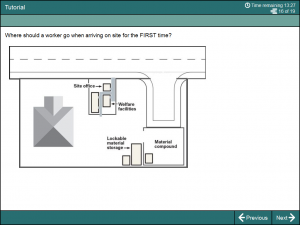
CSCS Questions
All the questions that will appear in your CSCS exam are developed by the Construction Industry Training Board (CITB).
CSCS Test Revision
The structure of the CSCS Test has been designed to encourage you to demonstrate knowledge and understanding of all the relevant and key areas which you will come across when working in any construction environment. In order to prepare effectively for your test, you should take the CSCS mock test and consider signing up for an account.
CSCS Test Pass Mark
Read about the CSCS Test pass mark here.
CSCS Test Booking
How to Book a CSCS Test
Booking a CSCS test is straightforward and can be done online or by telephone. You should be able to get an appointment for your test at the CSCS test centre of your choice within two weeks. When booking, you will be offered a test date and time immediately.
Online
To book online, you will need to sign up with Pearson VUE, the organisation that provides the test. Register here:
https://wsr.pearsonvue.com/testtaker/signin/SignInPage/CITB
Once you have registered, you’ll be able to sign in and book your test.
Telephone
For telephone bookings, call 0344 994 4488 (English) or 0344 994 4490 (Welsh).
The line will be open between 8am and 8pm from Monday to Friday, and 8am to 12pm on Saturdays.
Post
To book by post, click here to download the postal application form. After printing out the form and filling it in, you will need to send it to:
PO Box 1286, Warrington WA1 9GN
You can also fax your application to: 0300 200 1177
For more information about the postal application, call the telephone number above.
When booking it’s vital to ensure that all your details, as well as those of the test date, time and allocation, are correct. Incomplete or incorrect details may cause unnecessary delays.
You can also opt to have a text message sent to your phone or an email sent out to you reminding you of your test 24 hours before its start time, during booking.
As soon as you’ve successfully made your booking, you should receive confirmation via email or post. The confirmation will contain relevant additional information and instructions which are necessary for your test. If you’ve not received confirmation, you will need to call the booking line to check the status of your booking.
Information Needed to Book
Before you book your CSCS Test, make sure you have the following information to hand, including:
- The exact type of test you want to take. Remember, depending on your chosen profession, you will need to take a CSCS Test for Operatives or a CSCS Test for Managers and / or a Specialist Test.
- Your personal details
- Your debit or credit card for payment
- Details of any special assistance you may require during the test
- Your unique CITB registration number, if you have already taken a CSCS Test in the past or have applied before for certain other card schemes, such as CPCS or CISRS.
CSCS Test Cost
The CSCS Test costs £21. After passing your test, you can apply for a CSCS Card at a cost of £36. Payment can be made via debit or credit card.
CSCS Test Centres
Your test will need to be taken at an approved CSCS Test centre. You will be able to find your nearest test centre at the Pearson VUE website (when you’re taken through to website, you will need to select the relevant CSCS Test, click the next button and you’ll then be able to input your post code or the name of your town/city to bring up a list of CSCS Test centres that are closest to you).
Specialist Assistance
There are several forms of specialist assistance available to you during the CSCS Test should you require them. These include:
Voice-Overs: Every CSCS Test has the option of being booked with an English or Welsh voice over if needed.
Foreign Languages: If English isn’t your first language, you will have the option of voice-assistance in the following foreign languages:
- Bulgarian
- Czech
- French
- German
- Hungarian
- Lithuanian
- Polish
- Portuguese
- Punjabi
- Romanian
- Russian
- Spanish
Please note, this only applies to the CSCS Test for Operatives. If you’re taking the CSCS Managers and Professionals Test or a Specialist Test, you’ll only have access to English or Welsh.
If you request to have additional voice-over assistance in one of the languages listed above, an interpreter can be also be requested. Again, this only applies to the Operatives Test.
Sign Language: For those taking the Operatives Test, British Sign Language (BSL) is available on screen. This form of assistance does not extend to the Managers Test.
Further Help: For further information about support and assistance, call the Special Assistance booking line on 0344 994 4491. Alternatively, you can send an email to citb.testingspecialassistance@pearson.com.
Cancelling or Postponing the Test
If you need to cancel or reschedule your test, you can do so in your Pearson VUE account, providing you signed up online. If the cancellation or rescheduling is made three working days (72 hours) before the date of your test, you will not be charged an administration fee.
If you made the booking via telephone, you will need to contact the booking line to make the cancellation. You will have to pay an administration fee to cancel or reschedule your test via phone.
Taking the CSCS Test
At the Test Centre
First and foremost, you should give yourself ample time to get to the CSCS test centre, aiming to arrive 15-30 minutes before your test is due to start. Don’t forget to take your:
- Booking email or letter
- Proof of photographic ID which also includes your signature. A photocard driving license or passport are two such forms of acceptable ID. See the full list of acceptable forms of ID here.
Upon arrival, a member of staff at the test centre will verify your documentation. Without these documents, you won’t be able to sit the CSCS Test and a refund won’t be provided. It is vital you don’t forget to bring these with you.
Taking the CSCS Exam
CSCS tests are computer-based. If you’re uncomfortable with using computer, don’t worry as the test only requires you to click the mouse or touch the screen to answer the questions. You may want to do some basic computer practice at home prior to the test, or go to the local library if you haven’t got access to a PC at home.
Prior to the start of your test, there will be a tutorial explaining how the tests works and how to navigate through the test, enabling you to get used the interface. You will then be allowed to start the CSCS exam.
During the test, there will be a countdown timer in the corner which will inform you of your progress and the time remaining until the end of your test.
After the Test
After completing the test, you’ll be directed to leave the room where you will be presented with a report of your score. The report will inform you of your result and provide feedback on where you need to improve if you failed.
Passed: After passing, you should, if you haven’t already, check the CSCS card types and consider applying and joining the relevant CSCS card scheme. To find out what is available to you and to check if you meet the relevant requirements for each scheme, go to the CITB website.
Failed: If you failed, don’t worry too much and take some time out to read through your score report, which will indicate where you went wrong. You might want to give yourself some time to revise, before rebooking when you feel confident again. You will need to wait 2 days (48 hours) before you’ll be able to sit the test again.
You can request a more detailed report by emailing testingservicesfeedback@citb.co.uk.



